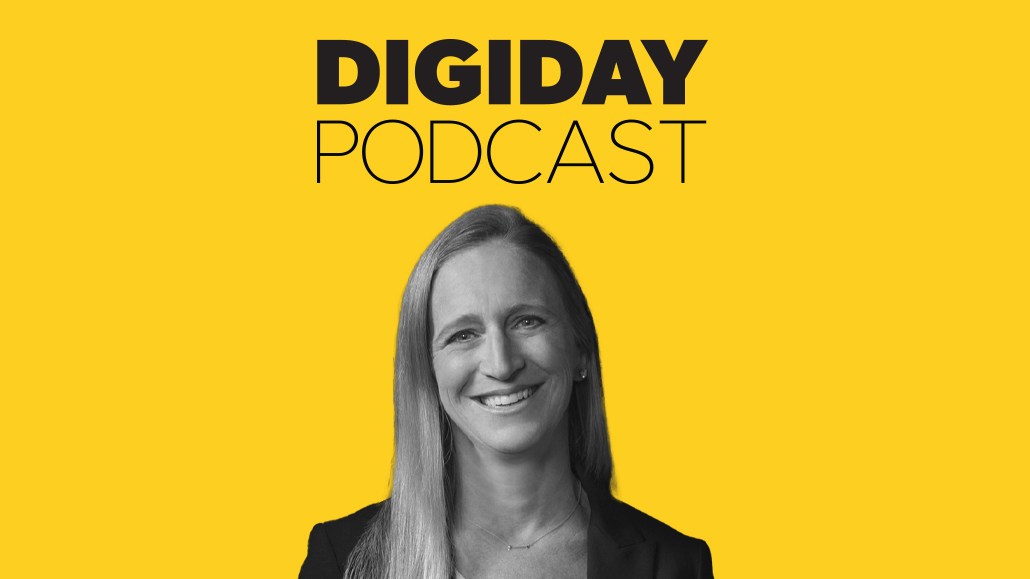Secure your place at the Digiday Media Buying Summit in Nashville, March 2-4
GoDaddy shifts gears: CMO Fara Howard talks about-face from provocative Super Bowl ads to focus on small businesses

Subscribe: Apple Podcasts • Spotify
GoDaddy has been known for its irreverent and racy spots with models — perhaps, most notably, its Super Bowl ads featuring former professional race car driver and model, Danica Patrick, back in 2010. It could be fair to say the web hosting and domain registration company knew how to make waves in the sports marketing space.
But the company has sat out of the Big Game for the last few years. It’s also moved away from its cheeky, sports-related spots to focus on small businesses and entrepreneurs, said GoDaddy CMO Fara Howard.
“I could answer this question in a lot of different ways,” Howard said on the latest episode of the Digiday Podcast when asked about the shift in marketing strategy, “but I believe that we need to tell that story by showcasing actual customers using our products and having success.”
On this episode of the Digiday Podcast, Howard talks about the push to boost product awareness, focusing on customers instead of celebrities, how it’s incorporating AI into its products and the company’s roadmap ahead.
Below are highlights from the conversation, which have been lightly edited and condensed for clarity.
Customers in ads
If you’re actually going to put your customers in your ads on your social media, on your website, you’re going to hear a lot from them on what’s working and what’s not working and what they need. So that strategy of being, not just customer-centric, but customer-first … is a huge part of our marketing strategy, [and] is incredibly beneficial for a marketing organization. Because [our marketing organizations] hear firsthand, real-time from customers on what’s working and what’s not. That same type of approach exists within our product teams, within our user experience, design teams through firsthand research and ad hoc conversations with entrepreneurs every day.
The B2B-B2C playbook
This is a huge point of strength for GoDaddy because we have been a B2B business who has always gone to market like we’re B2C. We talked about the fact that we used to advertise very broadly and that broad approach has been ultimately how GoDaddy got on the map, and we continue to do that. So much has changed in the past 20 years.
[Customers] need to know our name. Where they’re going to hear about us [is] on YouTube, on TikTok, on Instagram, maybe television, maybe a little bit of OTT. Maybe they saw some out-of-home content. But it can’t be all B2B tactics in my opinion. Because ultimately, what’s happening is people are getting smart on what needs they have and how they can be solved by digital media. Showing up in a B2C type of way, in those channels, makes certain that people understand your brand name and what your brand does, and increases the probability that customers will pick you for their jobs.
Internal-facing AI
We use AI for everything from copywriting, to headline writing, to image creation, to ultimately saving us time as marketers. So we can spend more time really diving deep into the areas that require more of our brain power and our intuition. But it’s been part of how we work for quite some time. In fact, as I think about the power of machine learning, our search engine marketing has been significantly bolstered by internal algorithmic machine learning that’s helping us better understand how we buy on Google. Those capabilities, although not generative AI-based, are just evidence of the power that technology can help us be better. It’s part of our culture. We’ve leaned into it.
More in Marketing

Future of Marketing Briefing: AI’s branding problem is why marketers keep it off the label
The reputational downside is clearer than the branding upside, which makes discretion the safer strategy.

While holdcos build ‘death stars of content,’ indie creative agencies take alternative routes
Indie agencies and the holding company sector were once bound together. The Super Bowl and WPP’s latest remodeling plans show they’re heading in different directions.

How Boll & Branch leverages AI for operational and creative tasks
Boll & Branch first and foremost uses AI to manage workflows across teams.







